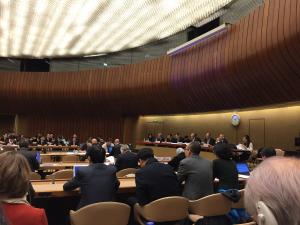In Geneva today, 40 representatives of the Chinese government faced three hours of hard-hitting questions from UN independent experts regarding China’s implementation of the UN Convention against Torture and Other Cruel, Inhuman or Degrading Treatment or Punishment. Today’s session began China’s fifth review before the UN Committee Against Torture on its compliance with treaty obligations.
The nine Committee members delved into almost every area of China’s responsibility under the Convention, including legislative, administrative, judicial, and other measures preventing acts of torture. (Under the rule that experts do not participate in the review of states of which they are nationals, the tenth member of the Committee, a Chinese member, was required to abstain from the process.)
The Committee experts’ questions covered not only the practice of torture and what has been done to effectively prevent it—such as the number of deaths in custody due to violent acts and whether there are statistics showing that laws against torture are enforced—but also the entrenched systemic problems that give rise to miscarriages of justice and torture, including political interference in the judicial process, impunity for the perpetrators of torture, and attacks on lawyers who represent cases deemed sensitive by the authorities. The experts also requested clarifications or more information about the impact of legislation on access to justice, information, or reprisals against citizen participation including the Criminal Law, State Secrets Law, National Security Law, Open Government Information Regulations, and Lawyers’ Law.
Cases raised by the experts included those of Gao Yu, Liu Xia, Cao Shunli, and individual lawyers. The Committee also repeated its requests for information on 24 Tibetans—information that China had failed to provide in its responses to the Committee’s June 2015 List of Issues.
In the second session tomorrow, November 18, the Chinese delegation—representing 21 government departments from mainland China, Hong Kong, and Macau, including the Ministry of Foreign Affairs, Ministry of Public Security, Ministry of Justice, State Ethnic Affairs Commission, and Standing Committee of the National People’s Congress—are expected to respond to the Committee’s questions.
“We have raised a million questions and we know that you will have a short time to answer—but this is not an impossible mission,” said Claudio Grossman, chairman of the Committee at the end of the session today.
For this review, China submitted its official report in 2013. The Committee issued a list of 39 further questions—the List of Issues, or LOI—in June this year. When China sent its responses in October, it made them available only in Chinese initially, which HRIC translated into English.
